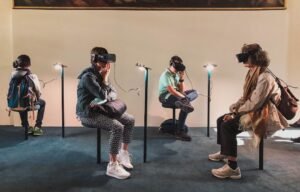AI Apps for iPhone
Artificial Intelligence (AI) has become a prominent technology in recent years, revolutionizing various industries. With its increasing integration into smartphones, AI is now available at our fingertips. iPhone users have a wide range of AI apps to choose from, each offering unique features and functionalities. In this article, we will explore some of the top AI apps available for iPhone users.
Key Takeaways
- AI apps for iPhone bring advanced features and functionalities to the palm of your hand.
- These apps cater to different needs, such as virtual assistants, productivity tools, and image recognition.
- AI apps are continuously evolving to provide better user experiences and accurate AI-driven results.
Siri
Siri, Apple’s virtual assistant, is integrated into every iPhone. It uses natural language processing and machine learning algorithms to understand and respond to user commands. With Siri, you can set reminders, send messages, make calls, and get answers to various queries with just your voice.
Siri learns your preferences over time and personalizes its responses to provide a more tailored user experience.
Google Assistant
Google Assistant is another popular AI app available on the App Store. It allows users to perform tasks using voice commands, get personalized recommendations, and receive real-time information. With its integration with other Google services, Google Assistant can provide seamless experiences across different apps and devices.
Google Assistant’s advanced AI capabilities enable it to understand context and provide relevant responses to complex queries.
AI-powered Productivity Apps
AI brings enhanced productivity features to various iPhone apps. For example, Notion leverages AI technology to provide smart note-taking capabilities and assist with organizing tasks and ideas. Grammarly utilizes AI algorithms to proofread and improve your writing by suggesting corrections, improving grammar, and enhancing overall readability.
AI-powered productivity apps help users be more efficient and enhance their overall workflow.
Image Recognition Apps
There is a growing number of AI-powered image recognition apps that enhance our visual experiences. Prisma uses AI algorithms to transform ordinary photos into artistic masterpieces by applying various styles and filters inspired by famous artists. Google Lens, another popular app, provides real-time information about objects, landmarks, and text captured by your iPhone’s camera.
Image recognition apps leverage AI to analyze and interpret visual content in innovative and creative ways.
| AI App | Key Feature |
|---|---|
| Siri | Virtual assistant with advanced voice recognition and natural language processing. |
| Google Assistant | Context-aware virtual assistant with seamless integration across various services. |
The Future of AI Apps
The field of AI is rapidly evolving, and we can expect even more advanced AI apps for iPhone in the future. With ongoing research and development in the AI space, these apps will continue to improve their accuracy, capabilities, and user experiences.
The future of AI apps on iPhone holds unlimited potential for enhancing various aspects of our lives.
| AI App | Key Benefit |
|---|---|
| Notion | Enhanced note-taking and task organization with AI assistance. |
| Grammarly | Improved writing quality through AI-driven proofreading and suggestions. |
Conclusion
AI apps have transformed our iPhones into powerful tools that can assist us in various ways. Whether it is getting instant answers, organizing tasks, improving writing, or enhancing visual experiences, AI apps offer exciting possibilities. As AI continues to advance, we can look forward to even more innovative applications that will further enrich our daily lives.

Common Misconceptions
Misconception 1: AI apps for iPhone can fully replicate human intelligence
One common misconception about AI apps for iPhone is that they are capable of fully replicating human intelligence. However, it is important to understand that AI technology, while advanced, is still quite limited in its capabilities compared to human intelligence.
- AI apps can perform specific tasks efficiently.
- AI apps may lack critical thinking abilities.
- AI apps cannot fully understand context or emotions.
Misconception 2: AI apps for iPhone are always accurate
Another common misconception is that AI apps for iPhone are always accurate in their outputs. While AI algorithms can process vast amounts of data and learn patterns, they are still prone to errors and biases.
- AI apps may provide inaccurate recommendations.
- AI apps may produce biased results based on flawed data.
- AI apps can make mistakes when interpreting complex queries.
Misconception 3: AI apps for iPhone can read minds
One misconception that arises from the portrayal of AI in popular media is the belief that AI apps for iPhone can read minds. However, AI technology primarily relies on analyzing data and patterns to make predictions, rather than directly accessing human thoughts.
- AI apps cannot access personal thoughts or private information.
- AI apps use algorithms to analyze patterns and make predictions.
- AI apps rely on user input to understand preferences and needs.
Misconception 4: AI apps for iPhone are always secure
Many people assume that AI apps for iPhone are always secure and protected against data breaches or hacking. However, like any software, AI apps can also be vulnerable to security threats if proper measures are not implemented.
- AI apps can be targeted by hackers seeking to exploit vulnerabilities.
- AI apps may collect user data, raising concerns about privacy.
- AI apps must follow cybersecurity best practices to safeguard user information.
Misconception 5: AI apps for iPhone will replace human jobs entirely
One common fear surrounding AI technology is the belief that AI apps for iPhone will replace human jobs entirely, leading to unemployment. While AI may automate certain tasks, it is more likely to complement human work rather than replace it completely.
- AI apps can streamline routine tasks, freeing up humans for more complex work.
- AI apps can augment human decision-making with data-driven insights.
- AI apps may create new job opportunities in AI development and maintenance.

AI technology has revolutionized the way we use mobile devices, making them more intelligent and efficient. From personal assistants to image recognition, AI apps for iPhone provide a wide range of possibilities. In this article, we present ten intriguing and informative tables showcasing the capabilities and benefits of various AI apps available on the iPhone platform.
H2: Language Translation
With AI-powered language translation apps, breaking down language barriers and communicating effectively with people from different parts of the world becomes effortless. These apps use innovative AI algorithms to recognize and translate speech or text in real-time, making communication seamless.
H2: Health and Fitness
AI-based health and fitness apps have become increasingly popular, helping users in monitoring their well-being, tracking exercise routines, and even providing personalized workout recommendations. Leveraging machine learning and data analysis, these apps offer comprehensive insights and customizable plans for users to achieve their fitness goals.
H2: Image Recognition
The ability of AI apps to recognize objects and scenes in images has brought significant advantages for users. Image recognition apps utilize deep learning algorithms to identify and categorize objects within photos, allowing users to conveniently search for specific images or receive information related to the subject matter.
H2: Virtual Assistance
Virtual assistants on iPhones make everyday tasks easier by providing quick access to information, setting reminders, sending messages, and even making suggestions based on user patterns and preferences. These AI-powered assistants learn from user interactions, continuously improving their capabilities over time.
H2: Navigation and Mapping
AI-powered navigation and mapping apps enable users to navigate unfamiliar places with ease. These apps incorporate advanced algorithms that efficiently analyze traffic conditions, recommend optimized routes, and provide real-time suggestions to allow users to reach their destinations efficiently.
H2: Music Recognition
Gone are the days of trying to figure out the title or artist of a catchy tune playing in the background. AI music recognition apps use sophisticated algorithms to identify tracks and provide relevant information, allowing users to discover new music or add songs to their playlists effortlessly.
H2: Financial Management
Managing personal finances can be challenging, but AI apps aimed at financial management make it more accessible. These apps offer features like expense tracking, budget planning, and even investment suggestions, empowering users to make informed financial decisions.
H2: Augmented Reality
Augmented reality apps leverage AI technology to overlay digital content onto the real world, enhancing user experiences and interactions. These apps combine computer vision and machine learning algorithms to create immersive and interactive virtual elements, turning the iPhone into a powerful AR device.
H2: Facial Recognition
AI-powered facial recognition apps provide enhanced security and convenience by accurately identifying individuals based on their facial features. These apps are utilized in various fields, including unlocking devices, authenticating transactions, and improving the accessibility of services.
H2: Personalized Shopping
AI-powered shopping apps personalize user experiences by analyzing preferences, purchasing histories, and browsing patterns. These apps provide personalized recommendations, discounts, and offers tailored to individual users, making the online shopping experience more efficient and enjoyable.
In conclusion, AI apps for iPhone have transformed the way we interact with our devices, amplifying their capabilities and improving our daily lives. From language translation to image recognition, these apps offer a wide range of functionalities that cater to different needs and enhance user experiences. With the constant advancement of AI technology, we can expect even more innovative and exciting applications to emerge in the future.
Frequently Asked Questions
What are AI apps?
AI apps are applications for iPhone that utilize artificial intelligence algorithms to perform specific tasks or provide enhanced functionality to the user. These apps can learn and adapt to user behavior, make predictions, recognize patterns, and process complex data to make intelligent decisions.
How to find AI apps for iPhone?
You can find AI apps for iPhone by visiting the Apple App Store. Search for keywords such as “AI,” “artificial intelligence,” or specific AI-related functionalities you are looking for, and browse through the results. You can also check curated app lists, technology blogs, and review websites to discover popular AI apps for iPhone.
What are some popular AI apps for iPhone?
There are several popular AI apps available for iPhone. Some examples include Siri, Google Assistant, Cortana, and Amazon Alexa. These apps offer virtual assistant capabilities, allowing users to carry out tasks by using voice commands. Other popular AI apps include language translation apps, personal finance management apps, and image recognition apps.
Can AI apps improve productivity?
Yes, AI apps can improve productivity by automating repetitive tasks, providing intelligent recommendations, and offering personalized assistance. For example, a scheduling app with AI capabilities can analyze your calendar, suggest ideal meeting times, and even automatically schedule appointments on your behalf. AI-powered personal assistants can also help manage tasks, set reminders, and retrieve information quickly.
Are AI apps secure?
AI apps, like any other software, can have varying levels of security. App developers employ various security measures to protect user data and ensure secure communication between the app and external services. However, it’s important for users to exercise caution when granting permissions and sharing sensitive information with AI apps. Always ensure you download apps from trusted sources and review app permissions before granting access to your data.
What are the requirements for running AI apps on an iPhone?
To run AI apps on an iPhone, you typically need a compatible iPhone model with a supported operating system. The exact requirements may vary depending on the specific app you intend to use. Some AI apps may require certain hardware features, such as advanced camera capabilities, to utilize their full functionality. It’s advisable to check the app’s requirements and compatibility information on the App Store before installing.
How do AI apps make use of data?
AI apps make use of data through a process called machine learning. These apps collect and analyze large amounts of data to train their algorithms and improve their performance over time. Data can come from various sources, including user input, user behavior patterns, external APIs, or pre-existing datasets. AI apps process and interpret this data to provide intelligent responses, recommendations, or predictions based on the information they have learned.
What are some limitations of AI apps for iPhone?
AI apps for iPhone have certain limitations. For instance, they heavily rely on internet connectivity for processing large amounts of data or accessing external services. Limited processing power and battery life of mobile devices can also impact the performance of resource-intensive AI algorithms. Additionally, AI apps might sometimes misinterpret user commands or provide inaccurate responses due to the complexity of natural language processing and contextual understanding.
Can AI apps replace human interaction?
No, AI apps cannot replace human interaction completely. While AI apps can carry out certain tasks efficiently and provide automated responses, they lack the emotional intelligence and intuition that humans possess. Human interaction involves empathy, understanding, and complex analysis that AI systems are not yet capable of replicating. AI apps should be seen as tools that augment human capabilities and assist in performing specific tasks rather than replacing human interaction entirely.
Are AI apps actively developed and updated?
Yes, AI apps are actively developed and updated by their respective developers. As technology advances and new AI techniques emerge, developers continuously improve and enhance their apps. Updates may include bug fixes, performance optimizations, integration with new APIs, and the addition of new features. It’s important for users to keep their AI apps up to date to benefit from the latest improvements and security patches.





